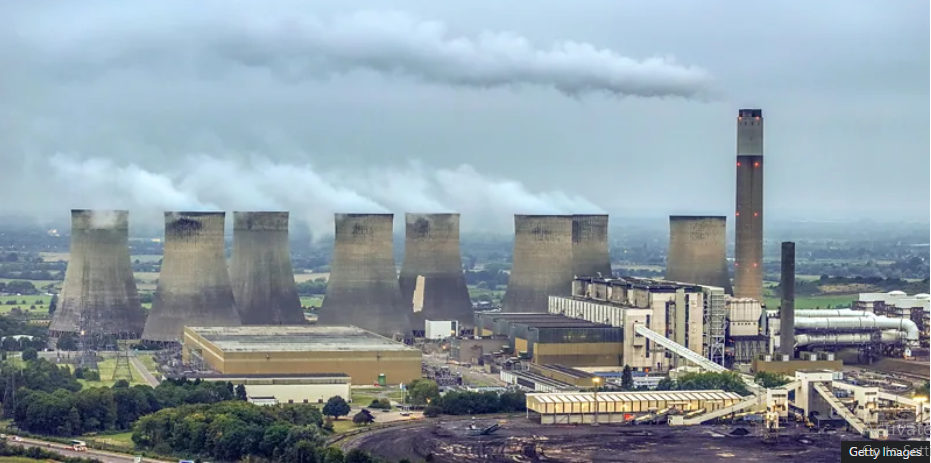The government plans to increase windfall taxes on oil and gas profits from 75% to 78%, among other measures

Firms across the UK’s oil and gas supply chain have expressed “grave concern” about government plans to hike windfall taxes and eliminate investment incentives to an industry that supports 200,000 jobs.
In an open letter to HM Treasury, seen by the BBC, 42 companies have warned that official plans threaten £200bn of investment in all forms of domestic energy, including renewables.
The signatories include manufacturing, engineering and technology companies.
The Treasury said, however, that its industrial strategy would create “thousands of new jobs in the industries of the future”.
The government currently plans to increase windfall taxes on oil and gas profits from 75% to 78%, extend the tax until 2030 and abolish tax incentives for further investment.
In the letter, issued by Offshore Energies UK, firms express concern that reduced investment and greater uncertainty would be felt throughout the supply chain “through jobs, and the communities this industry supports, both directly and indirectly.”
They also argue that oil and gas revenues are helping fund investment in renewable energy.
A hostile tax environment would threaten not only the oil and gas industry, but also the firms who invest in renewable energies using cash generated through fossil fuels, the letter suggests.
“The companies investing in nascent opportunities like floating offshore wind and carbon capture and storage will require the cashflow from a stable and predictable oil and gas business to fund these opportunities,” it says.
“Sufficient investment in the UK energy transition can only happen if we support, not undermine our domestic oil and gas sector.”
The new government’s plans to increase and extend windfall taxes while reducing investment allowances was clear in the Labour manifesto.
But the offshore energy industry had hoped for a consultation with the new government and are calling for a role in its industrial strategy council.
The letter says those across the energy industry look at current proposals with “grave concern that these would be a blunt response which could undermine the levers to long term solutions and jeopardise jobs in communities across the UK.”
David Whitehouse, chief executive of Offshore Energies UK, told the BBC’s Today programme the “vast majority” of the companies which signed the letter were “smaller companies”.
“These are not the energy giants that people talk about…They are the lifeblood of the UK economy,” he added.
A windfall tax of 78% would bring the UK in line with Norway but energy industry officials insist that Norway has had a much more stable tax and regulatory regime, which also offers generous incentives for investment.
The previous Conservative government imposed two tax hikes on UK oil and gas profits – raising them to 65% and then 75% in response to soaring energy prices following Russia’s invasion of Ukraine.
Last May, Harbour Energy, the UK’s largest oil and gas producer, told staff it would cut 350 UK jobs, blaming the UK government’s windfall tax changes.
‘Where will tax rises come from?’
A Treasury spokesperson said that it is “strengthening the previous government’s windfall tax to ensure North Sea oil and gas producers contribute their fair share towards our energy transition”.
“Our plans for a new National Wealth Fund and establish Great British Energy will create thousands of new jobs in the industries of the future,” they added.
Chancellor Rachel Reeves has previously said some taxes will be increased at the autumn Budget, but Labour has also said there would be no tax rises on “working people”.
Lucy Coutts, investment director at wealth manager JM Finn, this had led to “many industries and professions” beginning to wonder “where these tax hikes are going to come from?”
“Maybe tax hikes for oil and has, maybe even for banks. So everyone is a little bit nervous about what decisions Rachel Reeves is going to make in October,” she added.
Lufeiya 47 inch Computer Desk with 4 Fabric Drawers, Writing
Buy Now Amazon About this item Computer Desk Dimensions:Measuring 47.2″ L x 19.7″ W x 29.5″ H, this compact desk is perfect…
Spectacular firework displays will mark the start of the New
Fireworks and Air Pollution: A Global New Year’s Eve Tradition Under Scrutiny Millions of Fireworks Light Up the Skies AnnuallyAs the…
Why does Britain face flight chaos during bad weather?
Heavy Winds and Fog Disrupt Thousands of Flights Across the UK London — At the close of 2024, thousands of flights…
Trump to be sentenced over hush money case but judge
Judge Orders Sentencing for Donald Trump in Hush-Money Case Days Before Inauguration New York — Former President Donald Trump will be…
Samsung Galaxy Tab S9 FE 10.9” 128GB WiFi Android Tablet,
About This Item: Samsung Galaxy Tab S9 FE Series Circle It, Search It, Find It: Easily search for anything on your…
Pope urges negotiations to end Ukraine-Russia war
Pope Francis Urges Negotiations to End Ukraine-Russia War in Christmas Address In his annual Christmas Day address, Pope Francis renewed his…
















